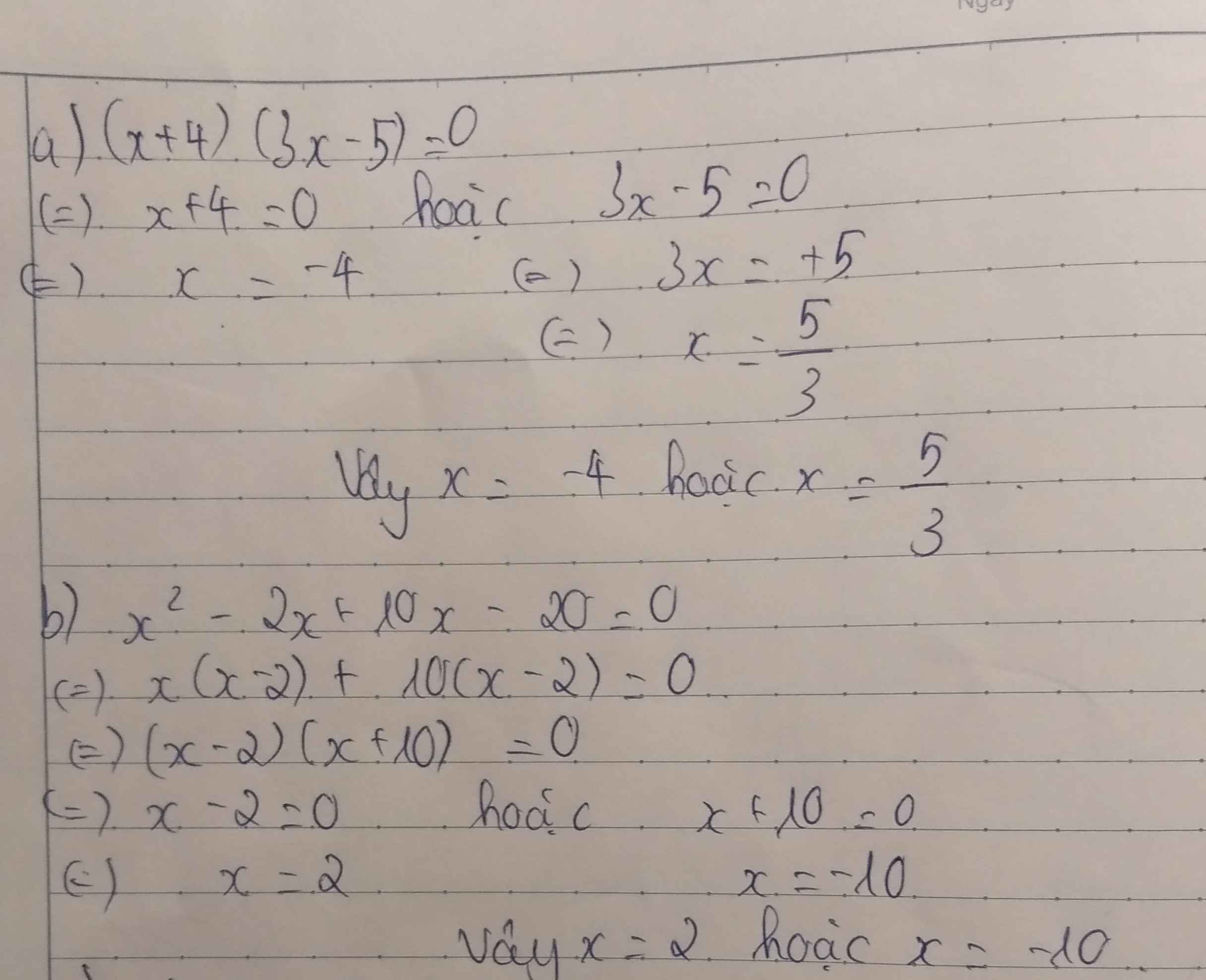Hãy nhập câu hỏi của bạn vào đây, nếu là tài khoản VIP, bạn sẽ được ưu tiên trả lời.

Bài 1:
a) \(\Rightarrow3x^2+3x-2x^2-4x+x+1=0\)
\(\Rightarrow x^2=-1\left(VLý\right)\Rightarrow S=\varnothing\)
b) \(\Rightarrow\left(x-2020\right)\left(2x-1\right)=0\)
\(\Rightarrow\left[{}\begin{matrix}x=2020\\x=\dfrac{1}{2}\end{matrix}\right.\)
c) \(\Rightarrow\left(x-10\right)\left(x+2\right)=0\)
\(\Rightarrow\left[{}\begin{matrix}x=10\\x=-2\end{matrix}\right.\)
d) \(\Rightarrow\left(x+4\right)^2=0\Rightarrow x=-4\)
e) \(\Rightarrow\left(x+6\right)\left(x-7\right)=0\)
\(\Rightarrow\left[{}\begin{matrix}x=-6\\x=7\end{matrix}\right.\)
f) \(\Rightarrow\left(5x-4\right)\left(5x+4\right)=0\)
\(\Rightarrow\left[{}\begin{matrix}x=\dfrac{4}{5}\\x=-\dfrac{4}{5}\end{matrix}\right.\)
Bài 2:
a) \(\Rightarrow3x\left(x^2-4\right)=0\Rightarrow3x\left(x-2\right)\left(x+2\right)=0\)
\(\Rightarrow\left[{}\begin{matrix}x=0\\x=2\\x=-2\end{matrix}\right.\)
b) \(\Rightarrow x\left(x-2\right)+5\left(x-2\right)=0\Rightarrow\left(x-2\right)\left(x+5\right)=0\)
\(\Rightarrow\left[{}\begin{matrix}x=2\\x=-5\end{matrix}\right.\)

a)(2x-3)(x+5)=0
\(\Leftrightarrow\left[{}\begin{matrix}2x-3=0\\x+5=0\end{matrix}\right.\Leftrightarrow\left[{}\begin{matrix}x=\dfrac{3}{2}\\x=-5\end{matrix}\right.\)
Vậy x=3/2 hoặc x=-5
a) \(\left(2x-3\right)\left(x+5\right)=0\)
\(\Leftrightarrow\left[{}\begin{matrix}2x-3=0\\x+5=0\end{matrix}\right.\) \(\Leftrightarrow\left[{}\begin{matrix}x=\dfrac{3}{2}\\x=-5\end{matrix}\right.\)
Vậy phương trình có tập nghiệm là: \(S=\left\{\dfrac{3}{2};-5\right\}\)
b) \(3x\left(x-2\right)-7\left(x-2\right)=0\)
\(\Leftrightarrow\left(x-2\right)\left(3x-7\right)=0\)
\(\Leftrightarrow\left[{}\begin{matrix}x-2=0\\3x-7=0\end{matrix}\right.\) \(\Leftrightarrow\left[{}\begin{matrix}x=2\\x=\dfrac{7}{2}\end{matrix}\right.\)
Vậy phương trình có tập nghiệm là: \(S=\left\{2;\dfrac{7}{2}\right\}\)
c) \(5x\left(2x-3\right)-6x+9=0\)
\(\Leftrightarrow5x\left(2x-3\right)-3\left(2x-3\right)=0\)
\(\Leftrightarrow\left(2x-3\right)\left(5x-3\right)=0\)
\(\Leftrightarrow\left[{}\begin{matrix}2x-3=0\\5x-3=0\end{matrix}\right.\) \(\Leftrightarrow\left[{}\begin{matrix}x=\dfrac{3}{2}\\x=\dfrac{3}{5}\end{matrix}\right.\)
Vậy phương trình có tập nghiệm là: \(S=\left\{\dfrac{3}{2};\dfrac{3}{5}\right\}\)

a
\(x^2\left(2x+15\right)+4\left(2x+15\right)=0\\ \Leftrightarrow\left(2x+15\right)\left(x^2+4\right)=0\\ \Leftrightarrow2x+15=0\left(x^2+4>0\forall x\right)\\ \Leftrightarrow2x=-15\\ \Leftrightarrow x=-\dfrac{15}{2}\)
b
\(5x\left(x-2\right)-3\left(x-2\right)=0\\ \Leftrightarrow\left(x-2\right)\left(5x-3\right)=0\\ \Leftrightarrow\left[{}\begin{matrix}x-2=0\\5x-3=0\end{matrix}\right.\\ \Leftrightarrow\left[{}\begin{matrix}x=0+2=2\\x=\dfrac{0+3}{5}=\dfrac{3}{5}\end{matrix}\right.\)
c
\(2\left(x+3\right)-x^2-3x=0\\ \Leftrightarrow2\left(x+3\right)-\left(x^2+3x\right)=0\\ \Leftrightarrow2\left(x+3\right)-x\left(x+3\right)=0\\ \Leftrightarrow\left(x+3\right)\left(2-x\right)=0\\ \Leftrightarrow\left[{}\begin{matrix}x+3=0\\2-x=0\end{matrix}\right.\\ \Leftrightarrow\left[{}\begin{matrix}x=0-3=-3\\x=2-0=2\end{matrix}\right.\)
a: =>(2x+15)(x^2+4)=0
=>2x+15=0
=>2x=-15
=>x=-15/2
b; =>(x-2)(5x-3)=0
=>x=2 hoặc x=3/5
c: =>(x+3)(2-x)=0
=>x=2 hoặc x=-3

a) ⇔ \(4x^2+4x-x-1=0\)
⇔ \(4x^2+3x-1=0\)
⇔ \(4x(x+1)-(x+1)=0\)
⇔ \((x+1)(4x-1)=0\)
⇒ \(\left[{}\begin{matrix}x=-1\\x=\dfrac{1}{4}\end{matrix}\right.\)
Vậy...
b) \(x^3-4x^2+4x=0\)
⇔ \(x^2(x-2)-2x(x-2)=0\)
⇔ \((x-2)(x^2-2x)=0\)
⇒ \(\left[{}\begin{matrix}x=2\\x=0\end{matrix}\right.\)
Vậy...
c) \(x^2-3x+2=0\)
⇔ \(x(x-2)-(x-2)=0\)
⇔ \((x-1)(x-2)=0\)
⇒ \(\left[{}\begin{matrix}x=1\\x=2\end{matrix}\right.\)
Vậy...

Lời giải:
a. $x(3x+1)+(x-1)^2-(2x+1)(2x-1)=0$
$\Leftrightarrow (3x^2+x)+(x^2-2x+1)-(4x^2-1)=0$
$\Leftrightarrow 3x^2+x+x^2-2x+1-4x^2+1=0$
$\Leftrightarrow (3x^2+x^2-4x^2)+(x-2x)+(1+1)=0$
$\Leftrightarrow -x+2=0$
$\Leftrightarrow x=2$
b.
$(x+1)^3+(2-x)^3-9(x-3)(x+3)=0$
$\Leftrightarrow [(x+1)+(2-x)][(x+1)^2-(x+1)(2-x)+(2-x)^2]-9(x-3)(x+3)=0$
$\Leftrightarrow 3[x^2+2x+1-(x-x^2+2)+(x^2-4x+4)]-9(x-3)(x+3)=0$
$\Leftrightarrow 3(3x^2-3x+3)-9(x^2-9)=0$
$\Leftrightarrow 9(x^2-x+1)-9(x^2-9)=0$
$\Leftrightarrow 9(x^2-x+1-x^2+9)=0$
$\Leftrightarrow 9(-x+10)=0$
$\Leftrightarrow -x+10=0\Leftrightarrow x=10$
c.
$(x-1)^3-(x+3)(x^2-3x+9)+3x^2=25$
$\Leftrightarrow (x^3-3x^2+3x-1)-(x^3+3^3)+3x^2=25$
$\Leftrightarrow x^3-3x^2+3x-1-x^3-27+3x^2=25$
$\Leftrightarrow (x^3-x^3)+(-3x^2+3x^2)+3x-28=25$
$\Leftrightarrow 3x-28=25$
$\Leftrightarrow x=\frac{53}{3}$
d.
$(x+2)^3-(x+1)(x^2-x+1)-6(x-1)^2=23$
$\Leftrightarrow (x^3+6x^2+12x+8)-(x^3+1)-6(x^2-2x+1)=23$
$\Leftrightarrow x^3+6x^2+12x+8-x^3-1-6x^2+12x-6=23$
$\Leftrightarrow (x^3-x^3)+(6x^2-6x^2)+(12x+12x)+(8-1-6)=23$
$\Leftrightarrow 24x+1=23$
$\Leftrgihtarrow 24x=22$
$\Leftrightarrow x=\frac{11}{12}$


1) tìm x :
5x. (x - 3 ) + 7.(x - 3 ) = 0
<=> ( x -3 ) . ( 5x +7 ) = 0
<=> x - 3 = 0 hoặc 5x + 7 = 0
<=> x = 3 hoặc x = -7/5
Vậy x € { 3 ; -7/5 }
3 ) chứng mình rằng :
7 1996 + 71995 + 71994 chia hết cho 57
71996 + 71995 + 71994
<=> 71994 . 72 + 71994 .7 + 71994
<=> 71994 . ( 72 + 7 + 1 )
<=> 71994 . 57 chia hết cho 57 ( vì 57 chia hết cho 57 ) ( đ..p.c.m )
Bài 1 : \(5x\left(x-3\right)+7\left(x-3\right)=0.\)
\(\Rightarrow5x^2-15x+7x-21=0\)
\(\Rightarrow5x^2-8x-21=0\)
\(\Rightarrow5x^2-15x+7x-21=0\)
\(\Rightarrow5x\left(x-3\right)+7\left(x-3\right)=0\)
\(\Rightarrow\left(x-3\right)\left(5x-7\right)=0\)
\(\Rightarrow\orbr{\begin{cases}x-3=0\\5x-7=0\end{cases}\Rightarrow\hept{\begin{cases}x=3\\x=\frac{7}{5}\end{cases}}}\)
Bài 2 : \(a,A=0\Rightarrow x^2-3x=0\Rightarrow x\left(x-3\right)=0\Rightarrow x\in\left\{0;3\right\}\)
\(b,A>0\Rightarrow x^2-3x>0\Rightarrow x\left(x-3\right)>0\)
TH1 : \(\hept{\begin{cases}x>0\\x-3>0\end{cases}\Rightarrow\hept{\begin{cases}x>0\\x>3\end{cases}\Rightarrow}x>3}\)
TH2 : \(\hept{\begin{cases}x< 0\\x-3< 0\end{cases}\Rightarrow\hept{\begin{cases}x< 0\\x< 3\end{cases}\Rightarrow}x< 3}\)
C, tương tự
Bài 3 : \(7^{1996}+7^{1995}+7^{1994}=7^{1994}\left(7^2+7+1\right)\)
\(=7^{1994}.57\)\(⋮\)\(7\)
\(\Rightarrow7^{1996}+7^{1995}+7^{1994}⋮\)\(7\)